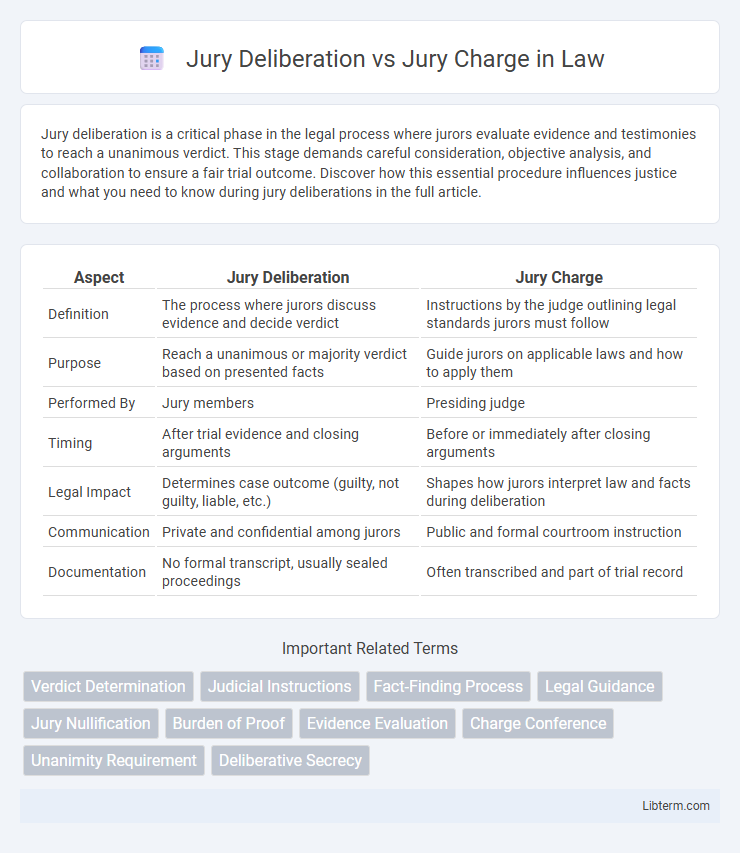Jury deliberation is a critical phase in the legal process where jurors evaluate evidence and testimonies to reach a unanimous verdict. This stage demands careful consideration, objective analysis, and collaboration to ensure a fair trial outcome. Discover how this essential procedure influences justice and what you need to know during jury deliberations in the full article.
Table of Comparison
| Aspect | Jury Deliberation | Jury Charge |
|---|---|---|
| Definition | The process where jurors discuss evidence and decide verdict | Instructions by the judge outlining legal standards jurors must follow |
| Purpose | Reach a unanimous or majority verdict based on presented facts | Guide jurors on applicable laws and how to apply them |
| Performed By | Jury members | Presiding judge |
| Timing | After trial evidence and closing arguments | Before or immediately after closing arguments |
| Legal Impact | Determines case outcome (guilty, not guilty, liable, etc.) | Shapes how jurors interpret law and facts during deliberation |
| Communication | Private and confidential among jurors | Public and formal courtroom instruction |
| Documentation | No formal transcript, usually sealed proceedings | Often transcribed and part of trial record |
Introduction to Jury Deliberation and Jury Charge
Jury deliberation is the process where jurors review evidence, discuss case facts, and work towards a unanimous verdict based on legal standards. The jury charge, delivered by the judge, provides jurors with essential legal instructions, outlining relevant laws, legal definitions, and standards required to guide their decision-making. Understanding the jury charge is crucial, as it frames the legal context within which deliberations occur and ensures jurors apply the law correctly during their discussions.
Defining Jury Deliberation
Jury deliberation is the process where jurors discuss evidence, evaluate testimonies, and apply the judge's instructions to reach a unanimous or majority verdict. It differs from the jury charge, which is the formal instruction given by the judge outlining the legal standards and issues jurors must consider. Effective jury deliberation ensures a fair evaluation of facts, guided by the legal framework established in the jury charge.
Understanding the Jury Charge
The jury charge is a set of legal instructions provided by the judge to guide jurors on the specific laws applicable to the case and the standards they must use to evaluate evidence. Understanding the jury charge is critical for jurors as it shapes their deliberation process and helps ensure their verdict is legally sound and based solely on the facts presented. Clear comprehension of these instructions supports accurate interpretation of legal elements, burden of proof, and the relevance of each piece of evidence during jury deliberation.
The Role of the Judge in Jury Charges
The role of the judge in jury charges involves providing clear, precise instructions to jurors regarding the law and guiding principles applicable to the case. Judges ensure that jury charges accurately reflect legal standards and help jurors understand their duties in evaluating evidence and reaching a verdict. Proper jury charges prevent confusion, reduce the risk of appeals, and uphold the integrity of the deliberation process.
Jury Deliberation Process Explained
Jury deliberation is the process where jurors discuss evidence and testimony to reach a unanimous verdict, guided by instructions known as the jury charge. The jury charge is a critical legal framework provided by the judge, outlining the laws relevant to the case and defining the jurors' responsibilities. Understanding the jury deliberation process involves recognizing how jurors apply the jury charge to systematically analyze facts, evaluate witness credibility, and weigh legal standards before deciding on guilt or innocence.
Timing: When Jury Charge and Deliberation Occur
Jury charge occurs immediately after the judge provides legal instructions to the jury, outlining the laws applicable to the case before jury deliberation begins. Jury deliberation takes place after the charge, during which jurors discuss the evidence and apply the legal standards instructed by the judge to reach a verdict. The timing of the jury charge is critical as it sets the framework for the deliberation phase, ensuring jurors are fully informed of their responsibilities and the legal criteria to consider.
Impact of Jury Charges on Deliberation Outcomes
Jury charges significantly influence deliberation outcomes by shaping jurors' understanding of legal standards and evidentiary requirements. Clear and precise jury instructions reduce confusion, minimizing errors and biases during decision-making. Inaccurate or ambiguous charges often lead to inconsistent verdicts and increased likelihood of appeals based on misinterpretation of the law.
Legal Standards and Instructions in Jury Charges
Jury charges provide the legal standards and instructions that guide jurors during deliberation, outlining the elements of the law that must be applied to the facts. These instructions clarify the burden of proof, definitions of relevant legal terms, and the criteria for evaluating evidence, ensuring jurors understand their responsibilities and the legal framework for decision-making. Accurate and precise jury charges are essential to uphold due process and prevent reversible errors in the judicial process.
Challenges and Misunderstandings in Jury Deliberation
Jury deliberation often faces challenges such as misunderstandings of legal instructions and difficulty in interpreting complex evidence, leading to inconsistent verdicts. Miscommunication among jurors can result in bias or dominance by certain members, impacting the fairness of the decision-making process. These challenges highlight the critical role of clear and comprehensive jury charges to guide deliberations effectively.
Comparative Analysis: Jury Charge vs Jury Deliberation
Jury charge involves the judge providing legal instructions and guiding principles to the jury, clarifying laws and outlining standards for evaluating evidence, which establishes the framework for decision-making. Jury deliberation is the actual process where jurors discuss the case facts, apply the judge's instructions, and reach a unanimous verdict based on the evidence presented during trial. While the jury charge sets the legal parameters, jury deliberation transforms these guidelines into a collective judgment through collaborative analysis and debate among the jurors.
Jury Deliberation Infographic

 libterm.com
libterm.com